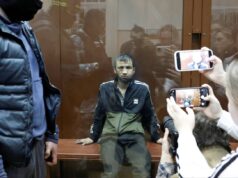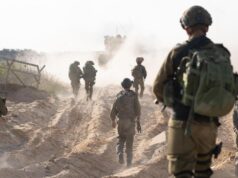Former Guantanamo Bay detainee Ahmed Ghailani was found not guilty on all but one charge yesterday in a civilian court in New York. Ghailani was tried, and acquitted, on over 280 charges in connection with the 1998 bombings of the U.S. embassies in Kenya and Tanzania, including one murder count for each of the 224 people killed. He was found guilty only for conspiracy to destroy government buildings and faces a minimum of 20 years in prison.
The first former Gitmo detainee trial held in a U.S. civilian court, the Obama administration was hoping that a conviction on most, if not all, of the charges would clear the way for civilian trials of other detainees, including Khalid Sheik Mohammed and four alleged co-conspirators accused of organizing the 9/11 attacks. Indeed, in his attempt to close down the detention center in Cuba, the president did not want to rely on military commissions alone, which were touted by his predecessor.

Ahmed Ghailani (R) was convicted of one count of conspiracy for his role in the 1998 terrorist bombings of the United States Embassies in Kenya (L) and Tanzania. |
|
Because of the unusual circumstances surrounding Ghailani’s case – circumstances that surround most of the alleged terrorists currently held at Gitmo – the prosecution faced significant legal hurdles getting the case to trial and securing multiple convictions.
After being captured in Pakistan in 2004, Ghailani was held for nearly five years in a site run by the CIA and then at Gitmo. On the eve of Ghailani’s trial last month, the judge barred prosecutors from using “a giant witness” because the man’s name was released during a CIA interrogation, where Ghailani’s lawyers say he was tortured. The witness, Hussein Abebe, would have testified that he had sold Ghailani the TNT used to blow up the embassy in Dar es Salaam, Tanzania.
The Obama administration’s plan to try Gitmo detainees in federal civilian courts is not the best way to secure the the convictions of alleged terrorists. Ghailani, a citizen of Tanzania, should not have been afforded the rights of an American citizen. The lessons for trying KSM in the future should be clear. Granting constitutional rights, and civilian trials, to alleged terrorists as if they are everyday criminal suspects creates serious national security risks that can easily be avoided. If the Obama administration seeks to protect the United States from terrorists attacks, he must orient his policies to match the threat.





